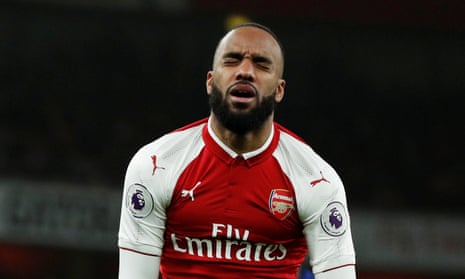Alexandre Lacazette accepted the pass from Danny Welbeck, took one touch to set himself and curled a glorious right-footed shot from the edge of the area into the top corner. It was September of last year and the screamer put Arsenal in control against Bournemouth at the Emirates. They would win 3-0.
Two Premier League games later, Lacazette was on target again, scoring twice in Arsenal’s 2-0 home victory over West Brom. At that point, the club’s record signing had four goals in six league appearances, having marked his debut in the competition with one after two minutes in the 4-3 home win over Leicester City. He was flying.
The France striker has now hit a lull and it is a moment to test him. Since his goals against West Brom, he has scored only four times in 17 club matches and, as he prepares to face Bournemouth once more – on Sunday lunchtime at the Vitality Stadium – he is in the throes of an eight-game drought.
“This guy is used to scoring 30 goals per year so, at the moment, even if he says no, I am sure he is frustrated,” Arsène Wenger says. “It certainly affects him a little bit but I’m not worried. It will come back and it’s in cycles. At the moment, he’s going through a cycle that is a bit more frustrating for him.”
Lacazette has been assaulted by culture shock on every level since his £52.7m transfer from Lyon last July. Wenger spoke in August about how the city of Lyon was a “special place” and it produced players with “their own mentality”. The Arsenal manager continued: “They don’t like to move away, usually. They produce their own players, the players who grew up around Lyon, like Fekir, Lacazette, Gonalons. They usually like to stay there. I did not know whether they wanted to move or not. It is a very specific French player at Lyon.”
The switch to England was always going to present its challenges for Lacazette – who moved relatively late for a Ligue 1 star at the age of 26 – among them the language, although he has been helped by the presence of a handful of compatriots including his France team-mates Laurent Koscielny and Olivier Giroud.
“It’s a difficult period because the family comes over and it’s a bit less football-orientated,” Wenger says. “I think the fact he lives here with French players and can speak French when needed, and that Lyon is not too far, is OK. But the first six months are always difficult.”
It is on the field where Lacazette has been walloped. Had he stayed at Lyon, he would have enjoyed two weeks off over Christmas and New Year. During the same period at Arsenal, he started four Premier League fixtures. Wenger admitted that Lacazette was “not at his best” in physical terms before Wednesday’s Carabao Cup semi-final at Chelsea and his performance was blunt. He skied a good chance in the 0-0 draw and was substituted midway through the second half.
Lacazette was asked to plough a lonely furrow at Stamford Bridge, working to close down defenders, and it has been a common theme for him away from home – where Arsenal have regularly failed to impose themselves.
“The physical pressure on strikers in England has become absolutely massive,” Wenger says. “The physical demands and the intensity in the challenges is much bigger than in France. In England, you play against teams who are organised and can physically cope with 90 minutes’ intensity. The defenders are much quicker than before. They are all athletes now at the back.
“As a striker, you have to provoke. At the back, you respond. So that means the intensity and the problems for the defender have to come always from you. The defender can sometimes respond to the situation with experience but the striker has always to be provocative. You need a lot of energy for that.”
Wenger noted how the frenetic festive schedule was a surprise to overseas players – “The body needs to get used to it; the mind, as well,” he says – and he estimated that most of them needed a year to acclimatise to English football, even the biggest names. Paul Pogba’s travails at Manchester United last season, after the France midfielder’s transfer from Juventus, were not lost on Wenger – and this was a player who spent his formative years at Old Trafford. “Pogba looks settled now, he dominates physically,” Wenger says. “In the first year, yes, you can suffer a little bit.”
Lacazette’s ability to cope with the physicality of the Premier League was always likely to be a problem but Wenger believes he is getting there.
“He has worked to cope with the intensity of the challenges,” the Arsenal manager says. “In France, you go down and it’s a free-kick. In England, you go down and it’s no free-kick. That is much more difficult for the striker to get used to. I think he resists better.”
Where Lacazette has impressed is with the sharpness of his movement, particularly his spins inside the box, his pace and his technique. Wenger also referenced “the quality of his understanding with the other players”. What Lacazette needs now is another goal against Bournemouth.

Comments (…)
Sign in or create your Guardian account to join the discussion